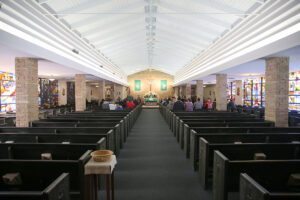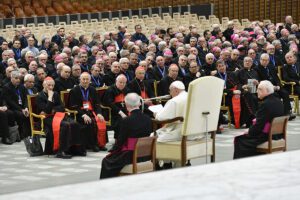WASHINGTON (OSV News) – A new survey indicates belief in spiritual entities continues to decline in the U.S. — and evangelization leaders say the data is a call for Catholics to examine their own witness to their faith.
Poll results released by Gallup July 21 show that 74% of U.S. residents believe in God, 69% in angels, 59% in hell and 58% in the devil.

The responses point to a new low in spiritual beliefs among U.S. residents, consistent with trends seen by Gallup – which has conducted the survey for the past two decades – and Pew Research Center.
The data also aligns with other indicators of waning religious interest in the U.S. Religious book sales were down 6% in 2022, while Christian and gospel music combined took just 1.7% of the total U.S. music market share in 2022, according to a year-end report from data company Luminate.
“I’m not surprised that belief in spiritual realities is dropping,” Bishop Andrew H. Cozzens of Crookston, Minnesota, said in an email to OSV News.
Bishop Cozzens, who is spearheading the U.S. bishops’ National Eucharistic Revival, said he has observed “a loss of the sense of the transcendence in the world” that often translates into a denial of the real presence of Jesus Christ in the Eucharist.
“People don’t understand that the whole world is a sacrament, which points to the reality of God,” he said. “We are living in an increasingly materialistic culture that tends to deny spiritual realities, and for that reason people cannot understand that everything that exists points to a deeper, invisible, spiritual reality.”
When that spiritual reality fails to translate into acts of everyday virtue and charity, a disconnect occurs, said Father Steve Grunow, CEO of Word on Fire Catholic Ministries, in an email to OSV News.
“If our witness to the God in Christ is not accompanied by an evident way of life that demonstrates that we are actually Christ-like, we should not be surprised if people do not take our beliefs and practices seriously,” he said.
Compared with results from Gallup’s first poll of this kind in 2001, the latest Gallup data — collected from 1,011 adults representing current U.S. demographics — shows belief in God and heaven has tumbled 16 points. Belief in hell is down 12 points, with belief in the devil and angels falling 10 points each.
Gallup found that declining belief in God was matched by nearly equal increases in uncertainty and nonbelief. Nonbelief has outstripped uncertainty with regard to heaven, hell, angels and the devil.
Just over half of U.S. residents (51%) believe in all five spiritual entities, with 11% stating they do not believe in any of them. Seven percent are unsure about all of them, while 31% replied they believe in some of the entities but not others.
Gallup noted that rephrasing its question regarding belief in God produced “slightly different results,” with 81% in last year’s survey affirming their belief when they were not offered the option to say they were unsure.
Belief in all five entities trended higher among frequent churchgoers, Protestants, nondenominational Christians and Republicans, said researchers.
The current poll also showed Protestants as more likely than Catholics to believe in all five spiritual entities, although “broad majorities” of Catholics continue to believe in each. Differences between the two groups were more likely to involve belief in heaven, hell and the devil.
Income, age and education levels correlated with belief in all five spiritual realities, said Gallup. Those with annual household incomes under $40,000, those over 55 and adults without a college degree were most likely to profess belief, and women were more likely than men to believe in all of the concepts, except for the devil.
But Father Grunow said that “well-known and referenced” cultural factors do not alone account for the downturn in religious belief.
“People will only discover why belief in God matters if they are invited to encounter the God in whom we have faith,” he said. “Extending this invitation is the responsibility of all the baptized, and it cannot be delegated to institutions, or just presumed to have happened through the vapors of ethnicity.”
His own pastoral experience sheds light on some glaring gaps in missionary discipleship, he said — and “the usual suspects” for disaffiliation, such as “secularism, abuse scandals, the role of women (and) science versus faith” were not in evidence.
“I lived in one of the most secular cities in one of the most secularized states in this country, and … the most prevalent answer I received to the questions of why (the unaffiliated) did not believe in God or attend church services … was ‘because Christians are mean,'” he said. “Consider the results of the Gallup poll in relation to that insight and let it sink in.”
In addition, “you have to look at the anthropology of the human being” to evangelize, Marlon De La Torre, senior director of evangelization for the Diocese of Columbus, told OSV News. “You have to identify with that human being, understand what they’re going through.”
Presenting the Gospel as missionary disciples means “we can’t throw a tool or program at other human beings,” he said. “We have to throw another human being at them.”
“The heart leads to the heart,” he said, referencing the approach of St. Francis De Sales.
De La Torre also stressed the need for Catholics to be formed in their faith in order to share it effectively with others. “Tell me why you believe,” he said. “And not in theology terms. I’m not asking for Aquinas. I’m asking you to be real.”
Reversing the trends identified by the poll will be difficult in the short term, but “if we invite more and more people to an encounter with the living Jesus Christ, this will have a profound effect,” said Bishop Cozzens.
“When people encounter the truth of a reality they cannot see, but they can sense with their souls, then they are open to the truth of the spiritual world in which we live,” he said. “In fact, we live in a spiritual world where there is a great struggle happening. … Angels, demons, heaven, hell are profoundly real realities that affect us all. When people meet Jesus, they come to see this.”

